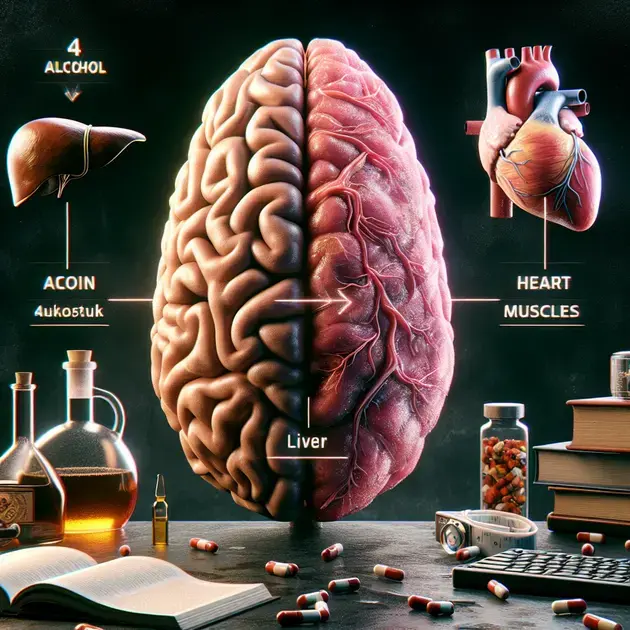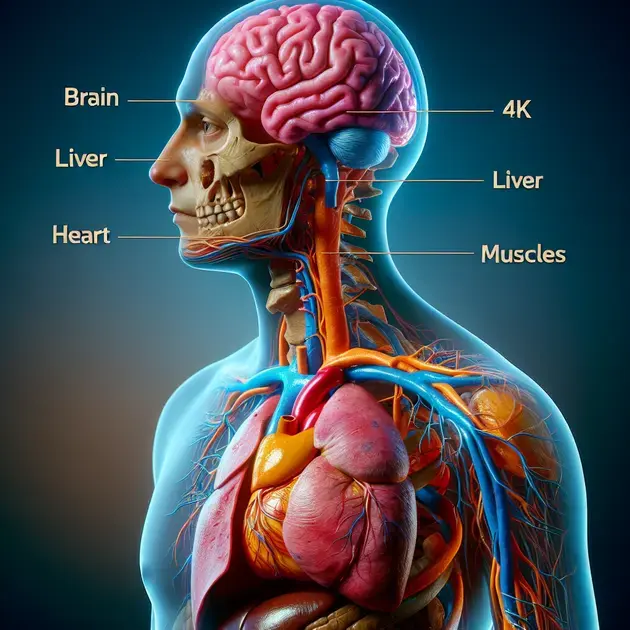Understanding the Effects of Alcohol on Your Body is crucial for making informed decisions about alcohol consumption. As one of the most widely used substances around the world, alcohol can have significant impacts on various aspects of your health and well-being.
Recent studies have shown that even moderate alcohol consumption can have adverse effects on the brain, liver, heart, and other vital organs. By understanding how alcohol affects your body, you can take proactive steps to minimize potential risks and prioritize your health and overall wellness.
The Impact of Alcohol on Brain Function
Alcohol consumption has a significant impact on brain function, affecting various cognitive abilities and neurological processes. One way alcohol affects the brain is by altering neurotransmitter levels, such as gamma-aminobutyric acid (GABA) and glutamate, leading to changes in mood, behavior, and coordination. To understand this impact, one can use the app “DrinkControl” to track their alcohol intake and monitor how it affects their cognitive functions over time. By analyzing this data, individuals can see the direct correlation between alcohol consumption and its effects on their brain.
Additionally, alcohol can impair the brain’s ability to form new memories and retrieve existing ones, leading to memory lapses and blackouts. The app “NIAAA Alcohol Treatment Navigator” provides resources and information on how alcohol abuse can impact memory and cognitive function. By following the tips and guidelines offered by the app, individuals can mitigate the negative effects of alcohol on brain function and improve their overall cognitive health.
Furthermore, chronic alcohol consumption can lead to structural changes in the brain, such as shrinking of brain tissue and loss of white matter. The website “Alcohol.org” offers insights into the long-term effects of alcohol on brain structure and function, emphasizing the importance of moderation and seeking help for alcohol-related issues. By following the advice provided on the website, individuals can take proactive steps to protect their brain health and prevent further damage from excessive alcohol consumption.
In conclusion, the impact of alcohol on brain function is profound and can have long-lasting consequences on cognitive abilities and neurological health. By utilizing resources like the “DrinkControl” app, “NIAAA Alcohol Treatment Navigator,” and information from “Alcohol.org,” individuals can educate themselves on how alcohol affects their brain and take proactive measures to maintain optimal cognitive function.
How Alcohol Affects the Liver
The liver is one of the most crucial organs affected by alcohol consumption, as it is responsible for metabolizing and detoxifying alcohol in the body. Excessive alcohol intake can lead to liver damage, including fatty liver, alcoholic hepatitis, and cirrhosis. To understand how alcohol affects the liver, individuals can use the “Liver Advisor” app to track their drinking habits and assess the impact on their liver health.
When alcohol is metabolized in the liver, it produces harmful byproducts that can cause inflammation and scarring of liver tissue. The “Alcohol Effects on the Liver” section of the website “MedlinePlus” offers detailed information on the process of alcohol metabolism in the liver and the resulting damage it can cause. By educating oneself through this resource, individuals can make informed decisions about their alcohol consumption and prioritize liver health.
Prolonged alcohol abuse can also impair the liver’s ability to perform essential functions, such as processing nutrients, filtering toxins, and producing proteins. The “Love Your Liver” campaign provides tips and resources on how to protect and support liver health, including reducing alcohol intake and adopting a healthy lifestyle. By following the recommendations outlined in the campaign, individuals can take proactive steps to safeguard their liver from the damaging effects of alcohol.
In summary, the relationship between alcohol and the liver is intricate, with alcohol abuse posing serious risks to liver health and function. By utilizing tools like the “Liver Advisor” app, information from “MedlinePlus,” and guidance from the “Love Your Liver” campaign, individuals can educate themselves on the impact of alcohol on the liver and take proactive measures to maintain liver health.
The Relationship Between Alcohol and Heart Health
Alcohol consumption can have both positive and negative effects on heart health, depending on the amount consumed and individual factors. Moderate alcohol consumption, such as a glass of red wine with dinner, has been associated with potential benefits for heart health, including improved circulation and reduced risk of heart disease. To explore this relationship further, individuals can use the “Drinkaware” app to learn about the cardiovascular effects of alcohol and make informed decisions about their drinking habits.
However, excessive alcohol intake can have detrimental effects on heart health, such as high blood pressure, irregular heart rhythms, and increased risk of heart attacks. The American Heart Association’s website features a section on alcohol and heart health, providing guidelines on safe drinking limits and the potential risks of alcohol abuse. By following these recommendations, individuals can protect their heart health and reduce the negative impact of alcohol on cardiovascular function.
Chronic heavy drinking can also weaken the heart muscle and contribute to the development of conditions like cardiomyopathy and heart failure. The “Rethinking Drinking” guide from the National Institute on Alcohol Abuse and Alcoholism offers valuable insights into how alcohol affects the heart and strategies for reducing alcohol-related risks. By incorporating the recommendations from the guide into their lifestyle, individuals can promote heart health and minimize the adverse effects of alcohol on cardiovascular function.
In conclusion, the relationship between alcohol and heart health is complex, with both potential benefits and risks depending on consumption patterns. By leveraging resources like the “Drinkaware” app, the American Heart Association’s website, and the “Rethinking Drinking” guide, individuals can educate themselves on how alcohol impacts heart health and make empowered choices to support cardiovascular well-being.
**Understanding How Alcohol Impacts Muscle Function**
Effects on Muscle Growth
Alcohol consumption can have a direct impact on muscle function and growth. When alcohol is metabolized by the body, it can interfere with the way protein synthesis occurs in muscles. This interference can lead to a decrease in muscle growth and repair, making it more challenging for individuals to see progress in their fitness goals. Additionally, alcohol can dehydrate the body, which is detrimental to muscle function as proper hydration is essential for muscle performance.
Furthermore, excessive alcohol consumption can lead to muscle weakness and fatigue, hindering an individual’s ability to engage in physical activities effectively. This can result in decreased muscle endurance and overall strength, which can have long-term consequences on one’s fitness level.
It is important for individuals who are focused on muscle growth and performance to be mindful of their alcohol consumption, as moderation is key to maintaining optimal muscle function and development.
Impact on Muscle Recovery
Alcohol consumption can also impact muscle recovery after intense exercise. When alcohol is consumed post-workout, it can delay the body’s ability to repair and rebuild muscle tissue. This can prolong the recovery process, leading to muscle soreness and stiffness.
Moreover, alcohol’s effect on sleep quality can further hinder muscle recovery. Disrupted sleep patterns due to alcohol consumption can reduce the amount of restorative rest that muscles need to recover and grow. As a result, consistent alcohol intake can impede an individual’s ability to recover fully between workouts, affecting their overall performance and progress in the long run.
For individuals looking to optimize their muscle recovery and achieve their fitness goals, reducing alcohol consumption and ensuring adequate rest and hydration are essential factors to consider.
**
Conclusion
**
Understanding how alcohol impacts muscle function is essential for individuals focused on optimizing their fitness goals. Alcohol consumption can directly hinder muscle growth by interfering with protein synthesis, leading to challenges in muscle repair and development. Additionally, alcohol’s dehydrating effect can further compromise muscle function, emphasizing the critical role of proper hydration in muscle performance.
Excessive alcohol intake not only weakens muscles but also contributes to fatigue, limiting an individual’s ability to engage effectively in physical activities. This can result in decreased muscle endurance and strength, significantly impacting long-term fitness levels. Therefore, moderation in alcohol consumption is key for maintaining optimal muscle function and supporting muscle development.
When it comes to muscle recovery, alcohol can delay the body’s ability to repair and rebuild muscle tissue, prolonging the recovery process and resulting in muscle soreness. Moreover, alcohol disrupts sleep patterns, reducing the restorative rest essential for muscle recovery and growth. Consistent alcohol consumption can impede full recovery between workouts, affecting overall performance and progress in the long run.

